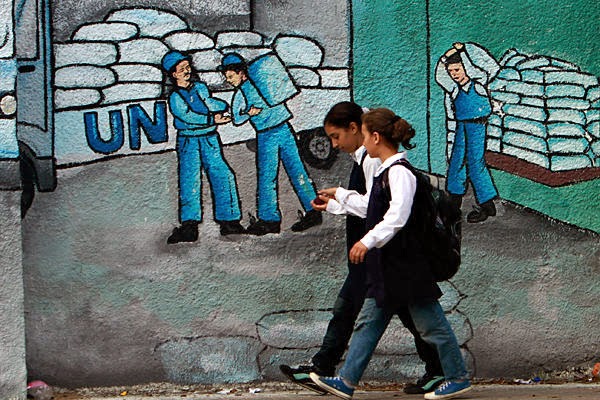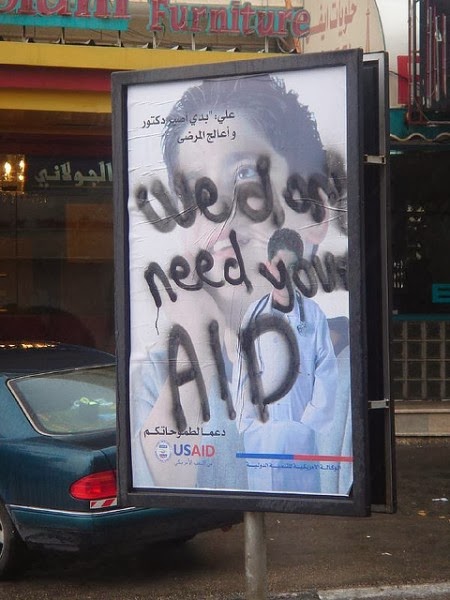By Miri –
The concept of “aid” usually invokes a whole lot of positive, altruistic and humanitarian associations, yet after decades of money flowing from the global North to the South, international aid to so called “underdeveloped” countries has come under increasing criticism. Many claim that rather than serving its alleged beneficiaries, international aid primarily serves the donors’ political and bureaucratic interests, and is therefore frequently referred to as a form of neo-colonialism.
 Especially after the signing of the Oslo Declaration of Principles in 1993, till the electoral victory of Hamas in 2006, the Palestinians became one of the most aid-subsidised people on earth. The money, predominantly coming from the US and the EU, was invested for three main purposes, first, it should support the “peace process” which in turn should lead to a two state solution, secondly, it was supposed to foster economic and social development, and finally it should be used to promote institution building.
Especially after the signing of the Oslo Declaration of Principles in 1993, till the electoral victory of Hamas in 2006, the Palestinians became one of the most aid-subsidised people on earth. The money, predominantly coming from the US and the EU, was invested for three main purposes, first, it should support the “peace process” which in turn should lead to a two state solution, secondly, it was supposed to foster economic and social development, and finally it should be used to promote institution building. Even the World Bank in its reports came to the conclusion that the notion of sustainable development constitutes an impossibility under the prolonged Israeli occupation, and yet high sums of money keep on being invested into the “inexorable meltdown“ that is the Palestinian economy. Rather than seeing the situation for what it is, i.e. a military occupation, which controls each and every aspect of Palestinian life, and rather than holding Israel accountable for the continued destruction of Palestinian livelihoods and infrastructure, aid agencies go on and keep on paying for the destruction, thereby making the occupation a livable reality for its residents.
Even the World Bank in its reports came to the conclusion that the notion of sustainable development constitutes an impossibility under the prolonged Israeli occupation, and yet high sums of money keep on being invested into the “inexorable meltdown“ that is the Palestinian economy. Rather than seeing the situation for what it is, i.e. a military occupation, which controls each and every aspect of Palestinian life, and rather than holding Israel accountable for the continued destruction of Palestinian livelihoods and infrastructure, aid agencies go on and keep on paying for the destruction, thereby making the occupation a livable reality for its residents.Similarly, the creation of the Palestinian Authority as the main recipient of international aid, has turned the Palestinian leadership into an entity completely dependent on subsidies, and therefore malleable to accept donor demands. The result is an “authoritarian, unaccountable and repressive” regime, which replaced its original goal of national liberation with one of becoming a security subcontractor for Israel.
 Dalia therefore concludes that the international aid system has further disempowered the Palestinian population and together with other activists appeals to aid organisations and agencies to rethink the claim that their work is “apolitical” and to stop being complicit in the deliberate devastation of the people it claims to serve. The only means to achieve real development is a just political settlement of the Israeli-Palestinian conflict. Research by Dalia has found that rather than aid, most Palestinians demand political intervention and the financial support they are entitled to in order to pursue their own development.
Dalia therefore concludes that the international aid system has further disempowered the Palestinian population and together with other activists appeals to aid organisations and agencies to rethink the claim that their work is “apolitical” and to stop being complicit in the deliberate devastation of the people it claims to serve. The only means to achieve real development is a just political settlement of the Israeli-Palestinian conflict. Research by Dalia has found that rather than aid, most Palestinians demand political intervention and the financial support they are entitled to in order to pursue their own development.
Comment (0)